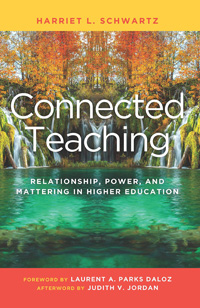 Reading Room Reading Room
Connected Teaching: Relationship, Power and Mattering in Higher Education
By Harriet Schwartz, PhD
In her new book, Schwartz offers a relational perspective on teaching. The book is a strong contribution to relational-cultural theory (RCT) literature, pulling traditional RCT concepts through the collegiate experience and offering new contributions to RCT theory. The book provides an important foundation for understanding the impact that teachers have on students and students have on teachers, components that require more discussion in the current academic environment.
RCT, with its focus on human connection, posits that emotional growth occurs in the context of relationships. Using RCT as a framework, Connected Teaching provides a contemporary lens to the teacher-student dynamic in higher education and proposes that there may be a variety, depth, and types of connection, but that at its core, there are components of relational teaching that strengthen the learning experience. “Applying RCT to the educational realm, I propose that relationship implies the availability of intellectual and emotional connection. We are not always connected to our students, nor they to us, but ideally they experience us as relationally available to them, accessible for connection … in connected teaching our students ultimately trust that we will reply to them with regard and a commitment to their learning” (p. 14). In part one of the book, Schwartz explores the concept of connected teaching, its importance in the student’s learning experience, and the nuances of modern students and environments (i.e., the use of texting between teacher and student).
Part two of the book focuses on the impact of teacher power and position, emotions, challenges, and intellectual mattering. All of these topics provide components to the connected student experience, but the concept of intellectual mattering is worthy of specific note. Defining both content mattering (what the student thinks is important to the teacher) and process mattering (the teacher demonstrates their commitment to the student in a manner that is meaningful to the student), Schwartz also examines the role of authenticity in these interactions, and notes that the demonstration and experience of mattering move the student-teacher relationship to one of power-with rather than power-over. In this vein, Swartz asks what many of us have wondered about online teaching and learning: Does the student have a meaningful experience of mattering in online courses? It’s something to consider as technology increasingly replaces the traditional classroom experience.
Schwartz’s experience and insight are highlighted in the two chapters that examine the real-life complexity of the process of learning: “Lessons Gone Awry and Frustrating Student Interactions” and “Disappointment and Failure.” Schwartz is to be commended for including this material that demonstrates her commitment to self-examination, a central component of RCT. We are also reminded that all relationships have conflict, disappointment, and failure, and that learning from these experiences produces growth.
The context used by Schwartz is the university experience, so Connected Teaching will be of significant interest to full-time faculty, social workers who teach as adjuncts, those who provide task or clinical supervision, and those working in positions where knowledge building is part of their role.
— Lisa Eible, DSW, MSW, LCSW, is a consultant and educator with more than 27 years of social work experience and advanced certificates in cultural competence and trauma.
|